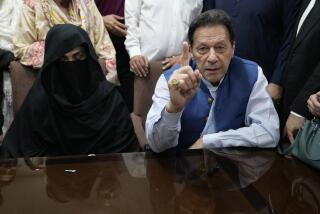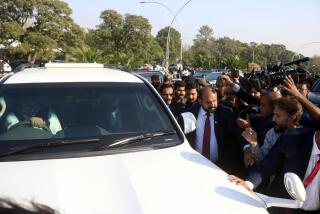Pervez Musharraf returns to a changed Pakistan
- Share via
KARACHI, Pakistan — When he left power in 2008, he was seen as a dictator who shunned democracy in a country that wanted to embrace it. On Sunday, former Pakistani ruler Pervez Musharraf returned to his homeland after four years of self-imposed exile, hoping that a nation readying itself for historic parliamentary elections would hail his momentous return.
But as he stepped off the plane at Karachi’s international airport, he came back to a very different nation — one that has no interest in bringing back military rule and appears to have little if any appetite to give a onetime autocrat a major spotlight on the political stage.
“He has a lot of misunderstanding about his political standing in Pakistan,” said Hasan Askari Rizvi, a leading Pakistani political analyst. “He has high hopes, but the political realities have changed in Pakistan. If he contests the elections, maybe he gets elected to parliament, or one or two people from his party get elected. But with two or three people in the legislature, you can’t really do that much. So I don’t think he’s going to be an important player in Pakistani politics.”
The 69-year-old former president and army chief arrived in Karachi, Pakistan’s largest city and its commercial capital, in the early afternoon after leaving Dubai, United Arab Emirates. Though he faces criminal charges linked to the assassination of a former prime minister and the slaying of a Baluch nationalist leader, the most immediate peril confronting him is the Pakistani Taliban, which says it has assembled suicide bomb squads to kill him.
Greeting him at the airport was a vocal crowd of several hundred supporters, many of them dancing and waving green flags and banners with his image. Musharraf’s aides had expected tens of thousands of backers to show up. Later in the afternoon, he spoke to the crowd, portraying himself as a savior risking his life for the sake of his homeland.
“People said I wouldn’t come back and would be afraid. But I fear only God,” Musharraf said. “Risking my life, I have returned because people wanted me to come back and save Pakistan.
“Where is that Pakistan which I left?” continued Musharraf, dressed in a traditional Pakistani loose tunic and baggy trousers. “I feel sad looking at the current state of the country. There’s poverty, unemployment and price hikes. The poor are suppressed. But I am back for you. I want to give you back the Pakistan that I left behind.”
Under Musharraf, Pakistan’s economy grew, but it stalled toward the end of his rule and has worsened under President Asif Ali Zardari.
The likelihood of Musharraf’s arrest diminished last week with a ruling from a Sindh provincial court granting him protective bail that effectively bars his detention for the next 10 days. Musharraf is wanted in Pakistan on charges that he did not provide enough security to prevent the 2007 assassination of former Prime Minister Benazir Bhutto. He also was charged by Islamabad authorities in 2009 with illegally detaining 60 judges in their homes. And in the southern province of Baluchistan, he faces charges that he ordered the killing of a Baluch nationalist leader in 2006.
He could be summoned to court on each or all of those cases, but analysts doubt that he will be jailed during the campaign season. Though the military has taken care to avoid any appearance of politically backing Musharraf, it also probably would take whatever steps needed to avoid the embarrassment of its former chief being put behind bars.
“There is no evidence against Pervez Musharraf,” said Musharraf’s spokesman, Rashid Qureshi. “We have made our preparations. Our legal team is working on it and is ready to face any kind of situation. There is no reason he should be arrested, because he is ready to appear before the court.”
Human rights activists say the government and its courts should ensure that Musharraf be held accountable for his actions during his nearly nine years in power.
“It is fortunate for Gen. Musharraf that Pakistan is a democracy today that will neither force him back into exile nor prevent him from participating in the political process, as Musharraf did to his opponents,” said Ali Dayan Hasan, Pakistan director for New York-based Human Rights Watch. “But it is the government’s responsibility to ensure that Musharraf is fully investigated and fairly prosecuted for abuses such as torture and disappearances that were widespread under his rule.”
Musharraf’s agenda in Pakistan includes leading his All Pakistan Muslim League party in contesting parliamentary elections slated for May 11. Pakistan’s history is marred by military coups and political ousters, and the upcoming elections will mark the first time one civilian government has democratically handed over authority to another. Zardari’s government has completed its five-year term, and the country’s election commission on Sunday announced its nomination for caretaker prime minister, Mir Hazar Khan Khoso, a former high court chief justice in Baluchistan province.
Musharraf’s backers insist that the former president has widespread support within a population wearied by the daily power outages, corruption and rampant militancy that has characterized governance under Zardari.
“People see him as a genuine leader who can pull the country out of the prevailing system,” said Chaudhry Shafiq, a senior All Pakistan Muslim League party leader. “People are fed up with the current system. They’ve suffered five years of looting.”
Though he does have support from some Pakistanis deeply disillusioned by the lack of progress in the last five years, most analysts believe Musharraf’s reputation is too damaged for him to make any kind of serious bid in the upcoming polls.
Musharraf stepped down in 2008 to avoid imminent impeachment proceedings. Since then, he has split his time between London and Dubai, giving lectures to Western audiences while trying to engineer his political comeback.
Times staff writer Rodriguez reported from Kabul, Afghanistan, and special correspondent Farooqi from Karachi. Special correspondent Nasir Khan in Islamabad contributed to this report.
More to Read
Sign up for Essential California
The most important California stories and recommendations in your inbox every morning.
You may occasionally receive promotional content from the Los Angeles Times.










